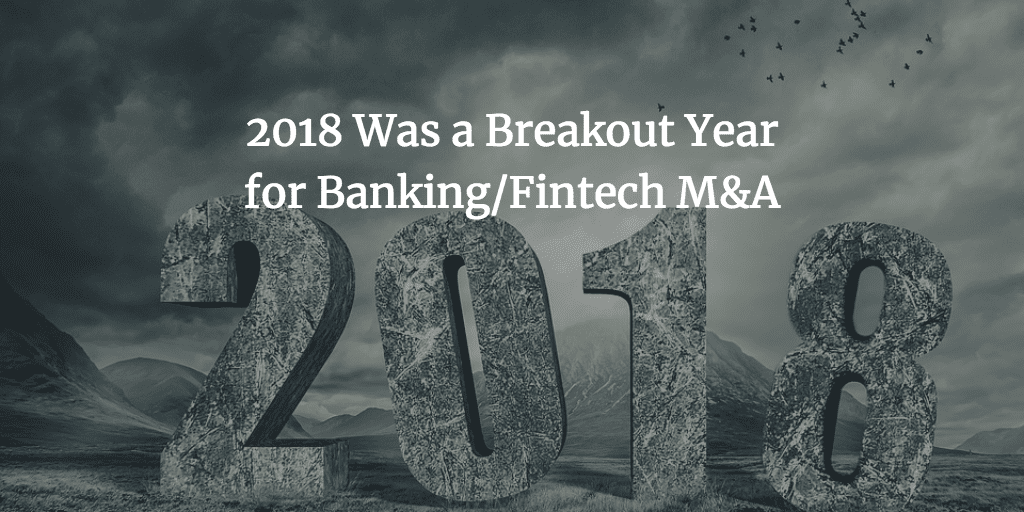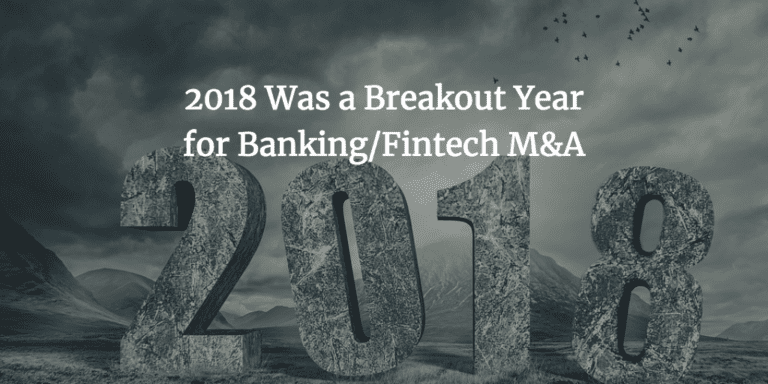
While M&A activity in the banking sector for 2017 was relatively subdued, a Deloitte study released at the end of that year suggested that 2018 had the potential to be a big year for banking M&A activity. That suggestion wound up being an accurate one. Led by the rallying of financial stocks that helped stabilize and boost the value of companies’ capital war chests, more favorable policy developments that helped ease regulatory constraints, rising interest rates and the tax reform bill’s boost to bottom lines, banking M&A made numerous headlines throughout the year.
Many large financial firms that had been sitting on the sidelines since the financial crisis, spent 2018 actively exploring and completing some major fintech acquisitions or investments as the continued rise in technology innovation played a major role in this increased activity as well.
For fintechs, 2018 got off to a fast start and that early momentum was felt throughout the year. Two massive deals dominated the headlines as the $12.9 billion acquisition of WorldPay by Vantiv and PayPal’s acquisition of Swedish fintech firm iZettle for $2.2 billion most certainly set the stage for a big year.
The total number of retail banking deals globally was numbered at 287 through the first three quarters of 2018 according to White & Case M&A Explorer, which was broadly in line with previous years. However, these transactions were worth a combined $76.2 billion – a 25% increase over the first three quarters of 2017.
Playing a major role in the increased M&A activity in the U.S. was the partial repeal of key parts of the D0dd Frank Act of 2010 which imposed higher capital reserves so that banks could better absorb loan losses and withstand future downturns. The measure won bipartisan support in Congress and essentially lifted the threshold over which banks are subject to enhanced regulation, and deemed “too big to fail,” from $50 billion in assets to $250 billion.
Across Europe, the Payment Services Directive 2 (PSD2), which entered into law at the beginning of 2018, was also a big M&A driver. PSD2 aims to level the playing field and increase competition by opening the big banks’ strict control of customer account information to third parties, who can use this data to offer their own services. To date, mainstream banks have been able to defend and grow their market share by offering conventional products, with little need for differentiation.
As this new “open banking” era continues to improve the sophistication, customization and range of services available to consumers, the pressure to innovate will remain on traditional banks. While some may choose to rely on internal R&D, others will look to partner or acquire fintechs to stay a step ahead of the dizzying pace at which technology continues to change the banking landscape.
On the fintech side of equation, as this sector continues to mature we are seeing an increase in the diversity of investors, including more active participation outside of the big banks and largest insurance companies. Globally, more mid-tier banks, along with insurance and wealth management companies, are recognizing the need to embrace fintech and the importance of making investments either directly or through accelerators, incubators or innovation consortia.
Below is a list of some of the M&A activity during a busy and very interesting 2018:
- Accenture acquired SEC Servizi from Intesa Sanpaolo
- Blackstone acquired Thomson Reuters
- Capital One acquired Wikibuy
- Clydesdale and Yorkshire Bank (CYBG) acquired Virgin Money
- Credit Karma acquired Approved
- Credit Karma acquired Noddle
- CUNA Mutual acquired Mirador
- Danske Bank acquired Spiir
- Deutsche Bank acquired ModoPayments
- Experian acquired ClearScore
- Experian acquires Compuscan
- Fifth Third acquired MB Financial
- Goldman Sachs acquires Clarity Money
- Goldman Sachs acquired Final
- Nasdaq acquired Quandl
- PayPal’s acquired iZettle
- RBS acquired FreeAgent
- Vantiv acquired Worldpay
We are not even halfway through the first month of 2019 and already we have seen a significant M&A deal announced with the acquisition of data aggregator Quovo by Plaid for a reported $200 million. So, 2019 should see continued investment in fintech and in enabling technologies like AI, big data and blockchain.


